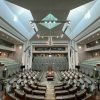Dept of Climate Change, Energy, Environment & Water
NESP News 25 August
Subscribe to receive alerts about NESP News via email.
August is the month of National Science Week. This edition of NESP News shows how good science is driving good decision-making.
The National Environmental Science Program (NESP) helps shape evidence-based policies and on-ground actions to care for Australia’s environment.
NESP also builds Australia’s science future. It supports early and mid-career researchers, so we have the experts we need for years to come.
NESP creates strong partnerships between scientists, government, and local communities. These connections help turn research into real-world solutions.
Read on to learn how NESP projects bring people together to deliver research that guides decisions and leads to positive action.
Smoke from wood heaters is a big source of air pollution. It contains tiny particles that can harm people’s lungs and health, causing up to 700 deaths per year.
The Sustainable Communities and Waste Hub is undertaking research to reduce wood heater emissions through:
The new national testing protocol will help measure smoke from wood heaters in an Australian context. This is being designed with experts, governments and industry to ensure it is fit-for-purpose.
In June, stakeholders explored how this research can help limit pollution from wood heaters.
The research team will soon deliver a draft of the new test protocol. It will provide the scientific foundation for a national standard that better reflects how Australians use wood heaters and how pollution can be reduced.
This research is informing decision-makers to better protect the health of people and the environment.
Sustainable Communities and Waste Hub
Kakadu National Park isn’t just stunning, it’s sacred. And now, the first-ever Indigenous-led Research Strategy has set the agenda for science questions to protect it.
This 10-year roadmap guides the new knowledge that’s needed, with Bininj/Mungguy Traditional Owners leading the way and working side-by-side with researchers. It’s hoped the answers will help to find the best way to manage big threats like fire, feral animals, invasive weeds and rising sea levels.
Why it matters:
Thanks to the Resilient Landscapes Hub and Parks Australia, this strategy is set to make a real impact.
You can watch Indigenous project leaders discuss their pride in delivering the 10-year Kakadu Research Strategy.
Resilient Landscapes Hub
Many of Australia’s migratory shorebird species have declined over recent decades. Following updated population trend estimates, 8 species are now listed as threatened.
The good news is that populations of several species are showing signs of stabilisation. A team of University of Queensland and Deakin University scientists want to find out why. They are studying which conservation actions are making a real difference along the entire flyway from Australia to Asia.
To do so, they need your help! Conservation practitioners are invited to share their insights through a short survey. Every insight adds to the big picture. So, if you’ve got stories, knowledge, or on-the-ground experience, wing them over. Let’s give these shorebirds the fighting chance they deserve!
This knowledge will help build a science-based handbook. It will support practical conservation work.
The team is also studying species survival rates. They are using a large dataset of over 630,000 sightings of banded birds. These sightings were collected over almost 50 years, mostly by volunteers.
The data is already showing results. The team found that 12 species of shorebirds often return to the same places each year. If those places lose their natural habitat, it can cause big problems for the birds.
The dataset is also used to model how birds connect sites during migration. This is important for understanding how diseases, such as avian influenza, might spread.
Marine and Coastal Hub
The Australian Meteorological Oceanographic Society (AMOS) 2025 conference was held in Cairns, near the Great Barrier Reef. Scientists came together to talk about how our climate is changing and what we can do about it.
Researchers from the NESP Climate Systems Hub shared their work on big issues like extreme weather, drought, sea-level rise and how climate change affects our economy. They showed new tools that help people prepare for extreme weather and make better choices for the future.
A special part of the conference was hearing from First Nation voices. The hub’s Indigenous Partnerships team ran a session about how Indigenous knowledge can help care for Country and guide climate action. Their message was powerful: listen, build trust, and work together.
The hub’s Knowledge Brokers also shared how they work with communities and governments to make sure research is useful and practical.
AMOS 2025 reminded us that science isn’t just for scientists-it’s a powerful tool for everyone. From farmers to councils to businesses, science can guide smarter decisions in a changing climate. Scientists are calling for people to get involved, ask questions, and push for change. Together, we can build a better future.
Climate Systems Hub
Stay in touch and find out more about the interesting work happening across the Australian Government’s climate, water and environment portfolios:
https://www.dcceew.gov.au/about/news/nesp-news-august-2025

